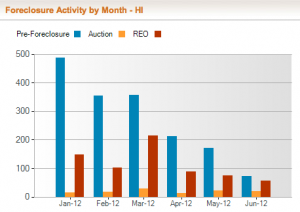Aloha, friends. Apologies for the time away, but holidays call and yours truly got engaged(!). But time waits for no one and there’s much to discuss. The biggest news upon us now has been the dreaded fiscal cliff that we narrowly avoided. President Obama was in and out of Hawaii, alternating between vacationing with the First Family in Kailua and presiding over some of the most delicate negotiations to hit Washington in quite some time. And when it appeared that we were all about to go over the cliff like Thelma and Louise, the elephants and donkeys of Congress cut a deal.
But where does the Fiscal Cliff deal leave Hawaii’s homeowners?
Great question. The biggest advantage that many people are talking about is the one-year extension of the 2007 Mortgage Forgiveness Debt Relief Act, which was set to expire December 31 2012. To recap: when a house is sold as a short sale, the difference between the sale price and the mortgage balance is called the deficiency. The banks will normally waive the deficiency to help facilitate the short sale (and avoid a costly foreclosure). However, the IRS considers debt forgiveness to be income, so while the homeowner will largely be off the hook for the deficiency, they would still owe taxes on that amount according to their tax bracket. The 2007 Act allowed the short selling homeowner to waive that tax liability as well, essentially making a short sale free.
The looming fiscal cliff threatened to let that policy expire and, with it, the hopes of many homeowners with underwater mortgages who weren’t able to close a short sale before the end of the calendar year. Now, with the extension through 2013, anyone closing a short sale this year will still be able to take advantage of the tax waiver on their deficiency. That’s THOUSANDS OF DOLLARS in savings when you look at the average deficiency of a mortgage for a short sale in Hawaii! I’ve personally spoken with owners who have been underwater over $500,000. Do the math on the tax savings, even at the lowest bracket, and you’ll see the impact of extending the policy another year.
However, it’s not just about over-leveraged mortgages. The fiscal cliff deal did not really address the nation’s growing debt load which continues to steadily rise. Nor did it help from another tax angle — payroll taxes. You may have noticed this already. Furthermore, the deal postponed any discussion on spending cuts for another two months.
So while a crisis may have been averted, it’s safe to say that there’s more work yet to be done.

